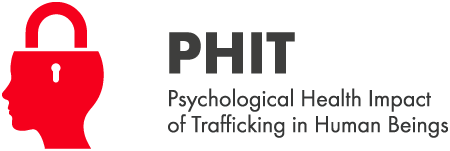Trafficking in Human Beings (THB) is a serious violation of human rights. There are various forms of trafficking, but all of them have in common that the traffickers perform a series of behaviours to exploit a person against their will. Thus, trafficking in human beings has been defined as the slavery of the 21st century. The most common examples of human trafficking occur in the area of forced prostitution, labor exploitation and begging, although it may also occur to commit small offenses or to extract organs.
Psychological Health Impact of THB for sexual exploitation on female victims (PHIT) is a two-year European project (January 2017 – May 2019) gathering twelve partners, coordinated by the University of Barcelona and funded by the European Commission.
Trafficking in Human Beings for sexual exploitation is an extreme form of gender violence. The fact that, under the guise of a freely-exercised prostitution are actually hiding sexual slaves is increasingly brought to light. However, very little is known about the psychological impact of these situations of physical and sexual violence, intimidation, humiliation and denial of dignity on victims. In most cases, Depression and Post-Traumatic Stress Disorder (PTSD) will be diagnosed as likely consequences. Nevertheless, the few studies that were carried out report it in a range of 30% to 98%, and this shows how little we know about the real impact of THB for sexual exploitation. Victims themselves mention fear, disgust, guilt, shame, ambivalent feelings and distrust of a system that was designed to protect them but that often requires them to collaborate for the identification of traffickers and pretends to obtain coherent testimonies without taking into account such circumstances.
The objective of PHIT is to increase this knowledge, to measure the impact of stakeholders’ interactions and interventions on the psychological well-being of victims while taking into account their psychological condition and preventing secondary victimization by this system.


